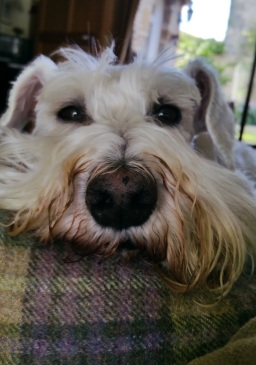Last Thursday was haircut day… we have a wonderful, patient lady who, every four weeks, comes to the house for the morning and creates order out of chaos; leaving behind three tidy dogs and an enormous bag of fluff. (The fluff is much appreciated by the local bird population in the spring, for nest-lining purposes… I would imagine that Lhasa fluff in particular must be very cosy – it certainly all disappears very rapidly.)
For Luna, who adores being brushed and loves meeting people, the arrival of Tracy is one of unrestrained joy and excitement. Lily is slightly more circumspect, but happy to hang around as she knows there will be biscuits in the offing… Theo, however, is horrified. After joining Lily in a traditional (and noisy) Schnauzer greeting, he scurries off at high speed in order to find a hiding place where, he hopes, we will be unable to find him until after Tracy has left… under my office desk is his sanctuary of choice. If he can’t see us, he reasons, there’s no way we’ll be able to see him.
Unfortunately for Theo, cowering behind the office chair, we somehow always manage to locate him and lift him, by now shivering piteously, onto the grooming table. Half an hour or so later, when nothing very terrible has happened to him apart from the loss of some fluff amidst lots of cuddles, he’s ecstatic to receive his obligatory biscuit from Tracy and run off joyously into the garden, to forget his fears until the next time.
Our worries and stresses are subjective – it depends what we have going on inside our heads as to how we perceive, and therefore how we experience, any given situation. When we are anticipating an event, we will have an internal representation of how we think the event will be. If we are focusing on a positive outcome, then we might feel pleasure, or excitement. But if we are focusing on what might go wrong, we are effectively playing out a scary movie inside our heads, which will result in us feeling stress and anxiety, even though our anticipated scenario may be far from real, or even likely.
Theo’s Teachings:
- What we are focusing on has a direct effect on our state of mind. If you are paying attention to negative things, try opening your mind to the possibility of the positive. If you look for it, you will find it.
- Our fears are often just False Evidence Appearing Real. When you are worried or anxious, ask yourself what other possible outcomes might there be?
- If you are facing something disagreeable, give yourself something to look forward to after the event, then imagine yourself out there in the future, looking back at the event. From this perspective, there is no anxiety.
- If you don’t want to be found, choosing the same place to hide each time is probably not the best strategy.

